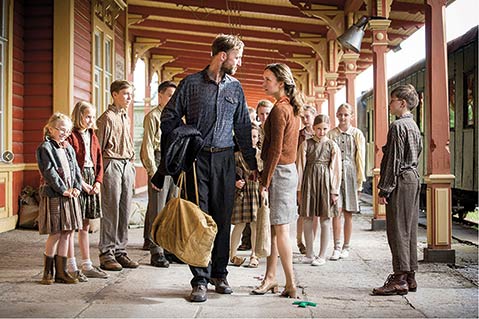‘The Fencer’
Director Klaus Härö

Under Soviet rule in the 1950s, Estonia was a dreary place. A shroud of fear hung over the country as secret police routinely rounded up suspected dissidents, and few dared challenge the unforgiving regime. The Fencer follows the true story of professional fencer Endel Nelis as he flees Soviet authorities and hides in a small town, where he tries to blend in as a gym coach. But with his founding of a fencing school that still stands today, he didn’t stay anonymous for long — especially when his team challenged the Soviets themselves.
The Finnish film was written by Anna Heinämaa and directed by Klaus Härö. It was selected as the Finnish entry for the Best Foreign Language Film at the 88th Academy Awards, and also nominated for the Golden Globe award in the Best Foreign Language Film category. I spoke with Härö by Skype in between appearances at the Palm Springs International Film Festival.
When did you first see the script? What were your thoughts upon reading it?
For me, this was a totally unexpected thing. I was working on something else some years back when a Finnish producer contacted me and asked, “Would you like to read this story that takes place in Estonia in the 1950s?” And I thought, “I’m not sure. That sounds really gloomy.” But as I started reading, it didn’t take very long for me to get the feeling of, “Wait a minute, there’s something here.” And I’m a Finn, so I’m pretty pessimistic, so I kept thinking, “Hold on. This is so good. It can’t be this good.”
What really got me hooked was the scene where Nelis is teaching the kids for the first time. There’s a bunch of kids, they don’t have weapons, they don’t have equipment, they can’t tell their left foot from their right, and he’s utterly frustrated. I thought, “This is interesting — here’s a guy who doesn’t want to be here in the first place. I want to find out why he’s here and how he’s going to make it with these kids.” When I turned the last page, I was like, “Whoa.”
Was there anything especially challenging, or especially easy, about making this film?
Initially we thought, “How do we pull this off? We’re Finnish, it’s in Estonia, it’s in Russia, there’s a lot of fencing and a lot of kids…” We didn’t know, but it was so important for us that we just decided to deal with all that later.
I met with Anna Heinämaa, who’s a first time screenwriter. She was an experienced novelist, and sometimes the transition to screenplays can be difficult, but for her it was not like that at all. She had adapted to the form in a wonderful way where she took our notes and transformed them into them into something organically connected with the story. I found her a terrific person to collaborate with.
Financing was not easy, but we went into it with the attitude that we would try, because people were really touched by this story.
Is Endel Nelis a well-known figure in Estonia?
Endel Nelis is famous in fencing circles, but he’s not a national hero in that respect. The film is based on a true story, but part of it is fiction. The basic idea was to tell Estonian history within the context of this fencing club. It’s a kind of David and Goliath story. Nelis died having seen the fall of the Soviet Union, and I think that’s one of the wonderful things of the film — that the small fencing club keeps going when the big empire is gone.
The script is very simple and clear. How did you want your directing to reflect that?
When I have a very straightforward, classical story, I can feel safe in the material. So you can find the small things, like you see the expression on little Marta’s face. My job is to put the emphasis on those moments. For me it was just a joy, because I felt so safe.
Marta was great actor.
Of all the kids, she was the only one who had some acting experience. When you cast kids, it’s all about their ability to really believe in what they’re doing, and she had that ability. And I think the kids got better at it. They got braver.
Directly or indirectly, does the film and its fencing comment at all on what’s going on in Russia today?
Fencing was a thing of beauty and hope that was introduced into a dour and gloomy place. The film reminds us that the Soviet empire was young, not even 50 years old at the time, while fencing goes way back into history. So what seemed at the moment to be something that was impossible to overcome, it turned out to not be the case. Fencing was a good reminder of that.
As we were shooting the film, specifically the scene where the grandfather gets taken away by Soviet secret police, people were on their phones. I was a little bit irritated and said, “C’mon guys, this is not Facebook time.” And they said, “We’re not on Facebook, we’re reading the news that the Russians are entering Ukraine.” It set a certain tone.
The film has had a strong reception. How does that make you feel?
We felt this was an important story to tell, and we’re just overwhelmed by all the attention. We’re very moved by it.



